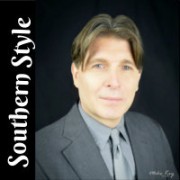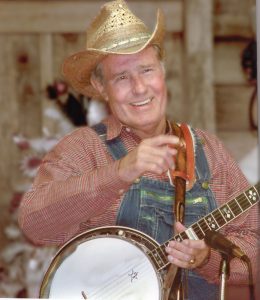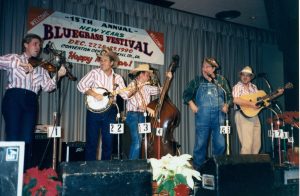Doyle Lawson affirms that “Life is a Story”
I have been honored to know one of the most admired bluegrass performers whose work has contributed an endless string of talented performers who trained as part of his band and later went out to establish a career on their own. Doyle Lawson’s ability to reach his audience is unparalleled and he reaches out to them again with his upcoming CD “Life Is a Story.”
Doyle describes is as a mix of Bluegrass styles “from the middle of the road to the very traditional,” the album never strays from the heart of the genre.
 “So much of what makes good Bluegrass and Country music compelling comes down to great songwriters – and the stories told in their songs,” Lawson said. “Life itself is really a continuous story that embraces the beginning, the middle and inevitable ending.”
“So much of what makes good Bluegrass and Country music compelling comes down to great songwriters – and the stories told in their songs,” Lawson said. “Life itself is really a continuous story that embraces the beginning, the middle and inevitable ending.”
For those not familiar with Doyle Lawson and Quicksilver, with nearly 40 albums to their credit, the group has won numerous major awards, including seven International Bluegrass Music Association Vocal Group of the Year honors. For his contributions to cultural heritage as a musical trailblazer, Doyle received the National Endowment for the Arts National Heritage Fellowship award in 2006, and was inducted into the Bluegrass Hall of Fame in 2012. DLQ is an influential force in today’s Bluegrass world, and their last two releases (In Session, Burden Bearer) received back-to-back Grammy nominations in 2016 and 2017, respectively.
“Life is a Story” was produced by Lawson and recorded in Sparta, Tennessee for Mountain Home Music Company, the new album features patriarch Doyle’s signature Lead and Baritone vocals, Mandolin and Mandola, and includes members: Josh Swift (Resophonic Guitar, Acoustic Lead Guitar and Percussion); Joe Dean (Banjo and Guitar); Dustin Pyrtle (Lead and Tenor vocals, Guitar); Eli Johnston (Lead and Baritone vocals, Bass) and Stephen Burwell (Fiddles).
The circular nature of life is highlighted in the lead off track, “Kids These Days,” which Dustin Pyrtle sings in a nuanced tone that reflects on innocence, lyrically invoking the perfect memories of childhood. “Little Girl,” a #1 Country hit for John Michael Montgomery written by the late Harley Allen, was a crew favorite that made the project because Doyle heard it sung so often at sound check. “They love that song,” recalls Lawson. “And the more I listened, the more I loved it too.” The inspiring “Life to My Days,” the offering’s first “great-track,” was written by friend and fellow hit songwriter Jerry Salley.
Band members Joe Dean, Eli Johnston and Dustin Pyrtle co-wrote “Life of a Hardworking Man” while the group was in the studio recording the new project.
“We already had the album title,” Lawson said. “The guys wanted to create a character within the narrative – and so they crafted this hammer-banging, big machine thumping tale of a typical working man.”
No life story would be considered complete without a bit of heartache, so Doyle and frequent co-writer Paul Humphrey sat down to write a song acknowledging that reality. The result is the fiddle-laced traditional Bluegrass “I See a Heartbreak Comin’.”
Fans can pre-order the digital release HERE. For more information, visit http://doylelawson.com/.


 I have been very pleased to watch many of the youth I once performed with on our stage achieve greater opportunities and see some of their aspirations bring them to the attention of people from around the world. Two talented North Carolina youth who came to our Share America stage with their father Sam in 2008 are vocalist/fiddler Summer Brooke McMahan and banjo stylist Brayden McMahan on banjo with their band Mountain Faith.
I have been very pleased to watch many of the youth I once performed with on our stage achieve greater opportunities and see some of their aspirations bring them to the attention of people from around the world. Two talented North Carolina youth who came to our Share America stage with their father Sam in 2008 are vocalist/fiddler Summer Brooke McMahan and banjo stylist Brayden McMahan on banjo with their band Mountain Faith. I sat in the artist green room at International Country Music Fan Fair between event appearances catching a break from the 25,000 fans who had come to Music City to meet the stars up close and personal. Over the years the chats sitting around the green room included folks such as Kenny Chesney, Paulette Carlson, Neal McCoy and countless others. On one of these breaks, I experienced a favorite conversation I shared in country music with Charley Pride. He came in and sat down beside me, introduced himself and then spent the next few minutes asking me about my life and career. It was such an honor feeling that this country music icon was interested in my work. I had always been interested and enthused by his. He is one of my favorites of all time.
I sat in the artist green room at International Country Music Fan Fair between event appearances catching a break from the 25,000 fans who had come to Music City to meet the stars up close and personal. Over the years the chats sitting around the green room included folks such as Kenny Chesney, Paulette Carlson, Neal McCoy and countless others. On one of these breaks, I experienced a favorite conversation I shared in country music with Charley Pride. He came in and sat down beside me, introduced himself and then spent the next few minutes asking me about my life and career. It was such an honor feeling that this country music icon was interested in my work. I had always been interested and enthused by his. He is one of my favorites of all time.
 Outside of Nashville’s historic Ryman Auditorium, country and bluegrass legend Ricky Skaggs unveiled a newly installed life-size bronze statue dedicated to his musical mentor, Bill Monroe.
Outside of Nashville’s historic Ryman Auditorium, country and bluegrass legend Ricky Skaggs unveiled a newly installed life-size bronze statue dedicated to his musical mentor, Bill Monroe. the Blue Grass Boys, named for Monroe’s home state of Kentucky.
the Blue Grass Boys, named for Monroe’s home state of Kentucky. Dickens recorded many novelty songs including “Country Boy,” “A-Sleeping at the Foot of the Bed,” “I’m Little but I’m Loud,” and his biggest hit, the No. 1 “May the Bird of Paradise Fly Up Your Nose.” His song “Take an Old Cold Tater (And Wait)” inspired Hank Williams to nickname him Tater.
Dickens recorded many novelty songs including “Country Boy,” “A-Sleeping at the Foot of the Bed,” “I’m Little but I’m Loud,” and his biggest hit, the No. 1 “May the Bird of Paradise Fly Up Your Nose.” His song “Take an Old Cold Tater (And Wait)” inspired Hank Williams to nickname him Tater.
 April 2017 interview that he is amazed where his banjo took him.
April 2017 interview that he is amazed where his banjo took him. James Watson (second from left) appears on stage with the Golden River Grass from left, Randall Franks, Gene Daniell, Doodle Thrower and Wesley Clackum in 1990 at the Jekyll Island Bluegrass Festival in Georgia. (Courtesy Randall Franks Media: Ronald Stuckey)
James Watson (second from left) appears on stage with the Golden River Grass from left, Randall Franks, Gene Daniell, Doodle Thrower and Wesley Clackum in 1990 at the Jekyll Island Bluegrass Festival in Georgia. (Courtesy Randall Franks Media: Ronald Stuckey) “I’ve always loved singing with Daryle Singletary. He’s one of the greatest singers in this generation of country music,” said Vincent. “It’s so fun to sing with someone who challenges me as a singer. The songs were given great thought, along with one that was totally unexpected. It’s one of the best projects I’ve ever been part of. I am so proud of this recording, and I cannot wait for the world to hear our wonderful creation,
“I’ve always loved singing with Daryle Singletary. He’s one of the greatest singers in this generation of country music,” said Vincent. “It’s so fun to sing with someone who challenges me as a singer. The songs were given great thought, along with one that was totally unexpected. It’s one of the best projects I’ve ever been part of. I am so proud of this recording, and I cannot wait for the world to hear our wonderful creation,